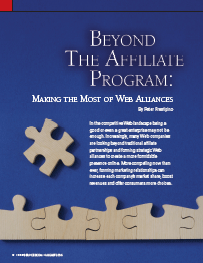Beyond the Affiliate Program:

Making the Most of Web Alliances
 |
In the competitive Web landscape being a good or even a great enterprise may not be enough. Increasingly, many Web companies are looking beyond traditional affiliate partnerships and forming strategic Web alliances to create a more formidable presence online. More compelling now than ever, forming marketing relationships can increase each company's market share, boost revenues and offer consumers more choices. Strategic alliances are formed when independent companies combine their resources to gain additional exposure - which, in the end, can result in more revenue. Formed when one company cannot serve the needs of a secondary market, these alliances enable companies to pool expertise, share risks and get solutions to market faster. |
Competitive pressures are forcing companies to develop creative and innovative ways to connect with customers and enhance their brand identity. Web companies are partnering with greater frequency to better compete for the Internet consumer and stay on top of the rapid pace of technological innovation.
Synergy Is Not a Buzzword
Many successful Web-based companies have moved past their irrational fear of forming Web alliances - they have determined that the benefits can far outweigh any costs incurred. They see the power of partnerships, the advantages of allying with other enterprises and, most importantly, that synergy is not a buzzword. Handled properly and with respect, the results are quick access to technology and expertise, broader distribution and more trustworthy marketing.
Companies building successful strategic partnerships and business alliances grow their businesses more quickly by penetrating new markets and rapidly acquiring new technical skills. Sound partnerships should benefit both sides - building more revenue and increasing brand identity.
The Nuts & Bolts
Finding quality partners is the most important element of successful alliances. A good first step is to start with search engines and directories and scour them for companies offering products and services which compliment your own. While search engines will help you locate a sizable field of potential prospects, using services such as Ranking.com or Alexa.com will help you refine your list by identifying those of the highest quality.
Finding potential partners is fairly easy, what's more difficult is developing a cooperative marketing arrangement that benefits both parties. It is essential that from the beginning you have a good idea of what should be exchanged and how that will happen. There are several ways that you can collaborate or ally with another Web enterprise to bring added value, revenue, traffic and/or expertise into your business.
The single most popular method of forming strategic alliances is with those in your immediate business industry. Cross marketing, as it's widely known, calls for two separate and distinct businesses to aggregate resources and collectively market to a specific customer base. This provides leverage for product offerings and generates greater marketing impact than could be achieved independently. Two of Website Services Magazine's advertisers, InternetSupervision.com, a website monitoring firm and 7Search.com, a leading pay-per-click advertising service have formed an alliance. They partnered to create a service which pauses and restarts pay per click advertising campaigns when websites experience downtime.
While both enterprises offer solutions independently, by working together they were able to successfully widen their reach.
While strategic alliances are often formed between businesses, partnering with those outside of your immediate business sector can be a great benefit as well. Working with trade associations, educational institutions, even local community organizations (e.g. chambers of commerce) provides access to targeted groups of potential consumers and gives your existing clients access to your alliance. These partnerships also establish confidence in your consumers that they are dealing with a respectable, community-oriented organization.
Success with Joint Ventures
It is not uncommon for partners to be disappointed in the results. Often, costs are higher and returns lower than expected. To ensure the highest degree of success, several considerations should be made.
For many, it's easy to decide to partner with another company but for others it can be downright difficult to trust another business. So should you trust your business partner? Of course you should, but you should also be savvy enough to develop a contract which clearly outlines responsibilities and obligations. A solid contract can go a long way towards securing trust and eliminating potential partnership-ending misunderstandings. Everything from profit sharing to ordering supplies can be mitigated with a contract that both parties agree on before taking that first step into a shared business.
Terms are also an essential part of successful Web alliances. Determine whether members will be allowed to participate in activities outside of the partnership which may compete directly with the alliance. Other important terms are how the alliance will be dissolved and whether or not business information should be kept confidential.
Establishing well defined goals and outlining specific duties of each partner is as crucial as trust. And a legal contract will only get you so far - there is usually quite a bit of leeway built into legal contracts. So, there should exist an understanding that some situations will fall outside of signed agreements. Discussing at length each member's goals, expectations and obligations can ensure that everyone in the partnership has a clear understanding of what to expect, and set a solid foundation for dealing with problems as they arise.
There is no greater component of successful relationships than an atmosphere of open communication. As you and your business partner will be sharing in the successes and failures of your alliance, it's important to keep an open discussion. Without it, all relationships will quickly dissolve. Make a point to not only outline specific optimal channels of communication, but set aside time to address both the positives and negatives of your relationships at regular intervals. It could make the difference between success and failure.
Partnering as a business solution is hardly new. The reasons for utilizing the established networks and solutions or products of others are clear and many. The reasons for not leveraging existing relationships or reaching beyond standard affiliate relationships are few and often baseless, but simple to understand - those of us responsible for a successful Internet presence often trust no one but ourselves, and sometimes not even that. With good research, a clear contract and trust in the
relationships, the power of partnerships can easily take your Web enterprise to the next level. Focusing not on finding the right company, but in forming the right company will help you leverage resources you otherwise would not have. -

Subscribe to Our Newsletter!
Latest in Affiliate Marketing








